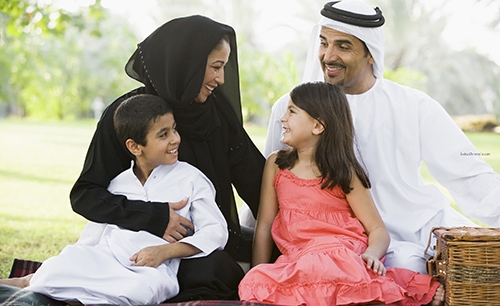Emirati families settle for few babies
Late marriages and high costs of raising children are among the several reasons for a dramatic dip in fertility rates among Emiratis in Dubai, according to findings that worry policymakers.
According to a report in Khaleej Times, birth rates are a critical factor in preserving Emirati families and upholding Emirati identity, says a recently released report - which is part of the Dubai Plan 2021 that prioritises health and education. An Emirati family has three children on an average now as compared to seven in the 1970s, says the report titled 'Fertility Rates among Emiratis in Dubai: Challenges, Policies and the Way Forward'.
The report, released earlier this month by the Mohammed Bin Rashid School of Government (MBRSG), shows that although fertility rates in the Gulf and the UAE exceed sub-replacement rates, they impact the overall imbalance in demographics.
A survey conducted by MBRSG among Emiratis cited rising cost of living, delayed marriages and women entering the work force as primary reasons for the low birth rate. Other causes included higher costs of marriages, personal preference for not having many children and spending more time on pursuing education and building a career.
Dr Ali bin Sebaa Al Marri, executive president, MBRSG, said, "We conducted a survey among UAE citizens in Dubai to come up with an accurate definition of the issues and practical recommendations that would contribute toward developing government policies related to fertility."
Dubai has already laid down basic objectives to maintain current fertility rates due to the continuous decline over the past years.
Aisha Miran, secretary-general for Strategic Management and Communication at Dubai Executive Council (DEC), said, "In Dubai, we continue to maintain acceptable fertility levels compared to these global figures." However, if the situation has to be corrected through policies, a number of issues need to be kept in mind.
The need for more Emiratis in workforce means both men and women should contribute to the economy. Today, women outnumber men in higher education constituting more than 70 per cent. If women do not enter the labour market, it will result in actual losses in the Gross Domestic Product and Emiratisation of jobs, reviews the report.
Any rapid increase in the fertility rate among the Emiratis will lead to the rise in the demographic rate, and subsequently the rise in the rate of youth who require government subsidy.
Lifestyle diseases such as diabetes and obesity also affect fertility rates. Dubai Health Authority has launched the Amal (Hope) initiative that provides medication and guidance on improving lifestyle.
The council also recommended the need to conduct more in-depth research on Emirati families, fertility issues and challenges of raising children.
Related Posts

